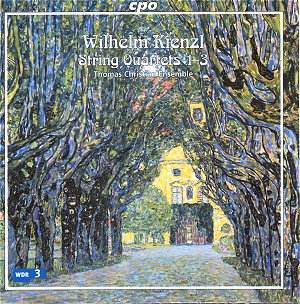Wilhelm Kienzl was born in rural Austria to parents
in the legal profession. Since his father was an amateur musician
and his mother an occasional actress, they quickly recognized
their sonís musical potential and mentored his study with music
teachers in the area. At the age of 19, Wilhelm went to Vienna
and earned his doctoral degree three years later in the field
of musical declamation.
Kienzl became well known as a conductor, writer,
and composer of operas, songs, and piano works. In current times,
his reputation has diminished and is limited primarily to his
vocal works. In an effort to redress the situation, CPO has issued
a disc of the Kienzl String Quartets.
Although Kienzl lived well into the 20th
century, he maintained a romantic musical posture throughout his
life. The new music from Debussy, Ravel, and Mahler had no hold
on him, never mind the more extreme innovations of Schoenberg.
Therefore, the almost forty years that separates his 1st
String Quartet from his 2nd is of no significance;
Kienzlís compositions do not reveal musical progression or the
recognition of new trends. The man was a rather sedentary individual
in all respects.
Most of the European composers who did not alter
their style as the 20th century unfolded saw their
popularity dwindle, and Kienzl was certainly in this category.
Also, in terms of the string quartets, his musical fecundity seems
to have decreased as the years went by while his penchant for
sentimentality increased.
Kienzlís first two string quartets are very pleasurable,
and he definitely knew how to write for four voices in a highly
melodic manner. Yet, his 2nd String Quartet has a syrupy
tone to it, and his 3rd String Quartet possesses a
strong degree of gushing sentimentality in addition to uninspiring
melodic content. Overall, the promise of his fine 1st
String Quartet is not realized in his later forays into the form.
I am also not enamored of the performances. The
Thomas Christian Ensemble could have tried to minimize the musicís
sentimental nature, but they instead play it to the hilt. The
main culprit is Mr. Christian, and he also has the dubious honor
of often sounding quite sour.
There are many other string quartets from the
late-romantic period that take priority over Kienzlís efforts.
In particular, Alexander von Zemlinsky, Karl Weigl and Franz Schmidt
come to mind as writing string quartets that do display a 20th
century aesthetic and also best Kienzl in musical inventiveness.
In conclusion, Kienzlís art is best presented
in his songs and operas. The most I can do is give this CPO disc
a low-priority recommendation for those who already have the string
quartet recordings of the more masterful late-romantic composers.
String quartet enthusiasts who feel greater affinity than I with
sentimental compositions might well think better of the disc.
However, beware of Kienzlís 3rd String Quartet that
is entirely forgettable.
Don Satz
